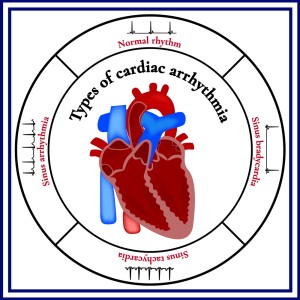The Root Cause of Cardiac Arrhythmias and the Diet for Heart Problems
 An arrhythmia, or irregular heartbeat, is a problem with the rate or rhythm of your heartbeat. It is called cardiac arrhythmias. Your heart may beat too quickly, too slowly, or with an irregular rhythm. It is normal for your heart rate to speed up during physical activity and to slow down while resting or sleeping.
An arrhythmia, or irregular heartbeat, is a problem with the rate or rhythm of your heartbeat. It is called cardiac arrhythmias. Your heart may beat too quickly, too slowly, or with an irregular rhythm. It is normal for your heart rate to speed up during physical activity and to slow down while resting or sleeping.
A cardiac arrhythmia is a common heart problem that can be triggered by many factors. An arrhythmia is an abnormal heart rhythm, which can lead to many different health issues.
Electrolytes affect the cardiovascular system and their balance is crucial for heart function. Electrolytes control the nerves and the muscles. The heart is a muscle and it has nerves that control it. There is a huge connection between electrolyte imbalances and cardiovascular function.
Electrolytes are magnesium, potassium, calcium and more.. It is electrolyte imbalances that create a problem. Electrolytes work together, and they need to be in the right balance for different functions in the body to work correctly. Certain electrolytes have a direct and indirect effect on each other. Thus, you need them in the right ratio. For example, if you have too much potassium, you’ll have a deficiency in magnesium. You can also have an arrhythmia when you have too much calcium and too little magnesium etc. Thus never take electrolytes separately (one at a time for a length of time) as they work in a balance.
When you get your electrolytes primarily from food, you will get them in the correct balance. Unfortunately, many of our foods are deficient in magnesium because our soils are deficient in magnesium.
If you take an electrolyte powder, it’s crucial to make sure it has the right balance of electrolytes.
Magnesium is incredible for the heart. There is a lot of data on magnesium preventing clots and arrhythmias or palpitations. High blood pressure is also associated with a magnesium deficiency and a potassium deficiency, as well as high calcium.
Medications can cause a deficiencies in the electrolytes. But, it’s important to be aware that some medications for your heart can throw off the balance of electrolytes in direct and indirect ways. It must be emphasized the importance of asking your doctor questions that explore underlying causes, rather than simply addressing symptoms. The proper balance of electrolytes is essential for a healthy cardiovascular system. So, you may want to bring this up with your doctor and ask deeper questions concerning this issue.
Study: https://www.ncbi.nlm.nih.gov/pmc/articles/PMC7917752/
Diet for Heart Problems
Three areas of problems.
Arteries
Arrhythmias
Heart Muscle
What leads up to these problems?
Inflammation – some sort of damage, and then the heart accumulates cholesterol as a “bandage” for the damaged arteries.
What causes Inflammation?
High levels insulin and low nutrients. It is the antioxidants that protect the tissue. What is needed in your diet is vegetables especially for Vit C, E & B vitamins
Get rid of refinded grains and sugars and carbohydrates – they deplete the B vitamins.
Heart muscle rhythem – what is needed is potassium and magnesium – avocadoes & leafy greens green are needed
When you have Insulin Resistance you don’t absorb potassium & magnesium
If you diet is low in Vitamn E
Vitamin E increases oxygen in the heart muscle. The heart will have to work harder and can cramp up. You need Vitamin B for heart muscle and E protects the lining of the artery.
If you are consuming refined grains you are not getting the nutrients you need. There are also things that deplete the body of needed nutrients. Grains contain nutrients but not when they are refined, the needed vitamins are then destroyed. Grain is also too high in carbs and this will spike in insulin.
You might notice that this diet resembles the Healthy Ketogenic Diet which you can read about.
Healthy Keto for a Healthy Heart.
RECOMMENDED
Want to take supplement with Electrolytes
STILL HAVE QUESTIONS? EMAIL AND GET YOUR QUESTIONS ANSWERED.
Sign up to receive the MCVitamins Newsletter!
Up-to-date info on the latest health-related news happening in the world
(available in English only)

